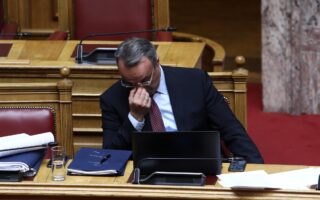It’s time we finished with fairytales

What would you wish for the country in 2023? Out of the many things I can think of, two stand out.
The first would be for Greece’s politicians to regain the ability to face real problems openly and honestly, and to be prepared to have a sincere discussion about them, rather than using those problems as an excuse and with the sole goal of grabbing onto power.
A second would be for them to remember what it is like to discuss problems, to take into account what each interlocutor has to say – instead of listening only to their own voices, ready to attack anybody with a different opinion.
Our politicians should learn to discuss issues seriously, without moving the goalposts as they see fit. A typical example of this attitude is the discussion taking place these days with regards to Spain’s decision to reduce or scrap value-added tax on basic food items for six months.
If VAT is reduced on basic necessities, the Greek government claims, state coffers will lose 3.5 billion euros in revenue in 2023, and this is something we cannot afford. If this is truly the case, then how can we afford reductions on the tax on dividends, wealth and transfers of parental property to children, but not a reduction in indirect taxation?
Our politicians should learn to discuss issues seriously, without moving the goalposts as they see fit
The Greek government also says that Spain does not have a debt as high as our own. That is true. But how does this square with the distribution of more than 65 billion euros on a largely clientelist basis over the past three years and the “allowances” handed out so generously to sectors that account for a large number of votes?
Any reduction in VAT, the government also says, will effectively disappear as a result of price increases. But aren’t those price hikes also fueled by income support, given that there is no price control of any kind?
The public debate should be held honestly and with a willingness to analyze problems before the different policies intersect. An example of what needs to be avoided is much of what is being said about economic growth. Instead of making an effort to highlight and understand the problem, we are being served baseless triumphalism because inflation lowers the debt-to-GDP ratio (as it artificially inflates GDP) or because it increases tax revenue by bleeding people’s incomes (since the same VAT rates are calculated at inflated prices). All this is packaged as “economic growth.” This must be another global first, since nowhere else in the world did they think of calling the impact of inflation “growth.”
Inflation is not growth and neither is what has been happening in the last two years. The economy is recovering from the losses it had suffered due to the Covid pandemic but its growth does not display the qualitative elements that entail real growth. On the contrary, along with the losses, it also seems to be recovering all the structural weaknesses that characterized it.
Furthermore, this growth is not due to some endogenous dynamic in the economy but to unprecedented state aid; it is state-fed growth, which is already weakening. Instead of 5.6% growth this year, it may hover around 4%. The worst thing is that this aid was/is given largely according to clientelistic criteria. If every business that was given aid was required to place a sticker at its entrance stating the amount it received and the reasons for it, the government would have a very big problem.
If politicians are forced to start speaking honestly, listening and getting down to business, we might have a chance to avert a repeat of our past sufferings.





